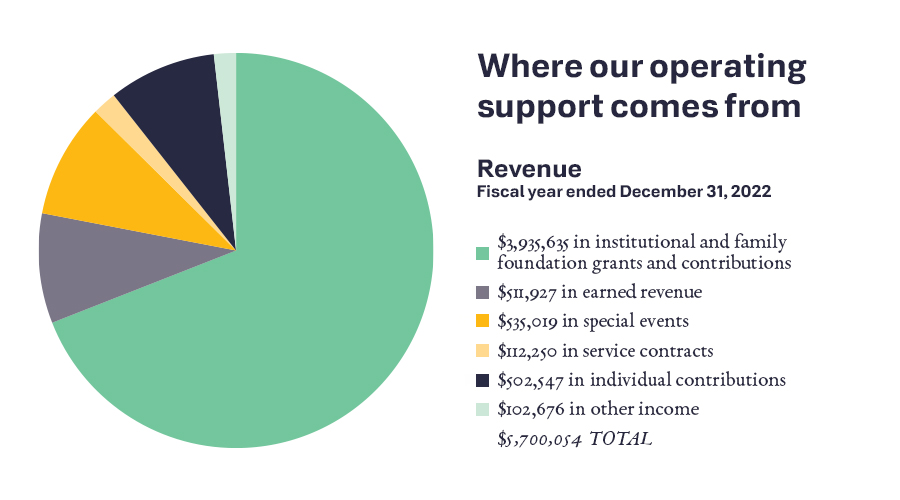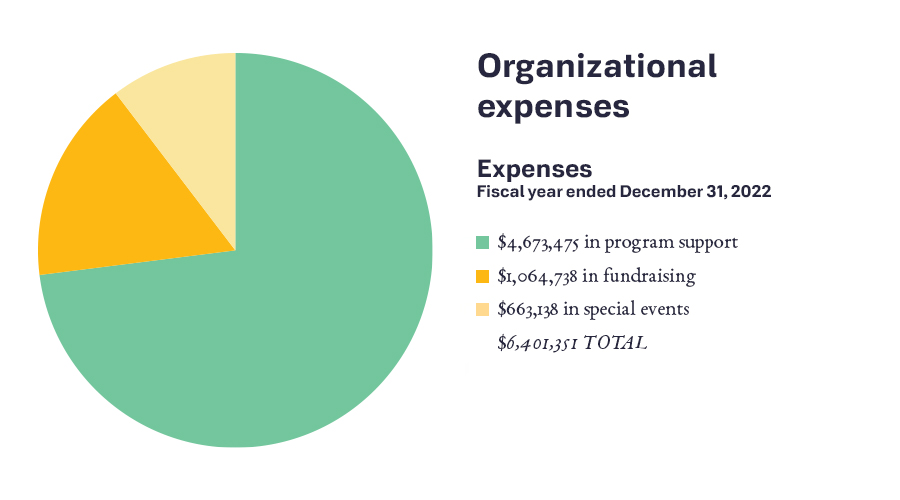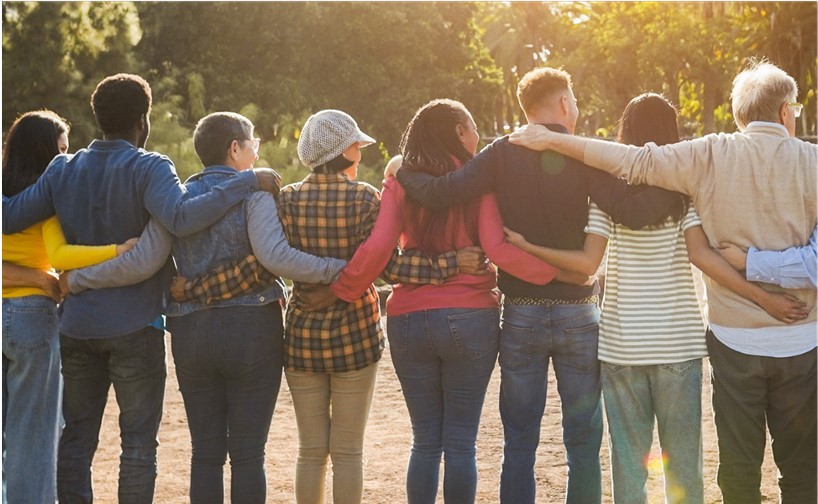
Last year, the Shriver Center on Poverty Law reimagined justice to create a future free from poverty and racism.
A nation without racism and poverty is a bold vision that takes commitment from everyone. Your leadership and generosity are what gives us hope in the fight for racial and economic justice.
During a challenging political environment in 2022, we fought to close the wealth gap for people of color amid a rise in racialized violence that harkens back to a darker time in American history. That’s why the work of the Shriver Center on Poverty Law remains so crucial in meeting urgent needs.
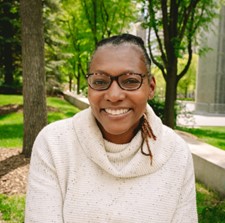
Last year, we successfully advocated for guaranteed income pilot programs in Chicago and Cook County. These programs provide regular, no-strings-attached money to people with low income. As a result, over 8,000 families now receive direct cash payments monthly. Across the country, guaranteed income recipients can pay rent and bills, buy groceries, or add to their savings account.
The Shriver Center played a key role in the state’s first task force on racial disproportionality in a child welfare system that fails Black and brown children. We will keep fighting the false narrative that criminalizes poverty and harms Black families the most. And through our groundbreaking national leadership program, the Racial Justice Institute, we also trained and supported a network of over 400 advocates working on racial equity issues across the country.
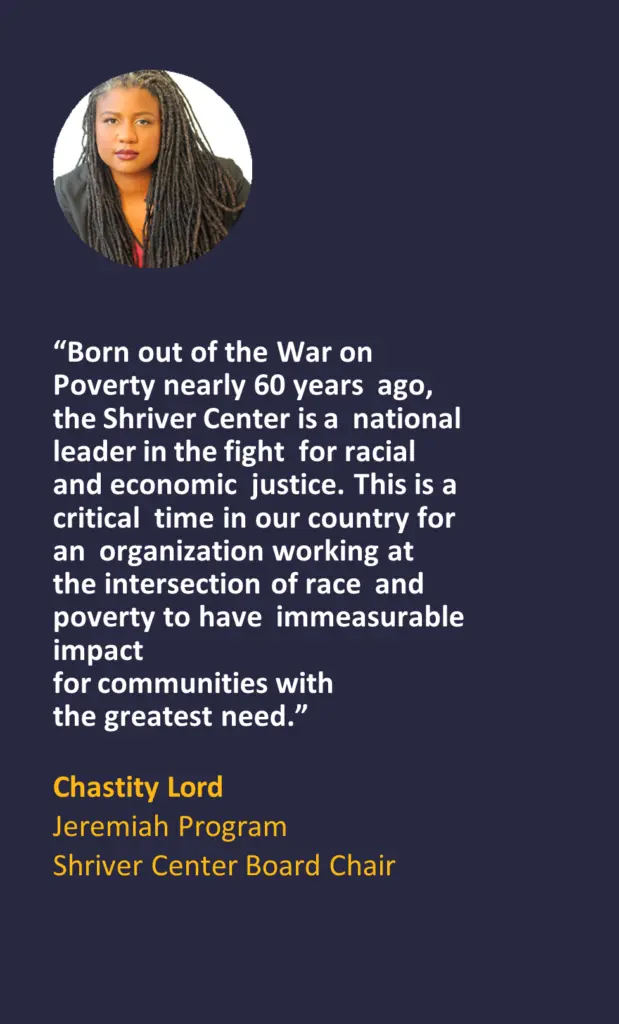
This critical work brought upon a time of reflection, rebuilding, and reconnection to accelerate and amplify our impact. We started the process for a new strategic plan, strengthened our leadership with a new Vice President of Advocacy, and increased support through our first in-person gala since 2019 and a successful year-end fundraising campaign.
As we get ready to launch our new strategic direction, we are more resolute than ever in our belief that poverty is a policy choice. With your help, the Shriver Center will continue to challenge our government to make a different choice — a choice to prioritize the livelihood and health of people experiencing poverty.
Many of you, like me, want to be part of the solution. In collaboration with you — whether as a donor, advocate, or legislator — we are creating real change for the people and communities that need it most.
We are truly grateful for your partnership. The better future we’re building is powered by your passion for our shared mission. Let’s keep reimagining justice together.

Audra Wilson
President & CEO
Illinois workers now entitled to up to 40 hours of paid leave per year, after passage of the Paid Leave for All Workers Act
undocumented immigrants
eligible for Medicaid look-alike coverage in Illinois
previously excluded
Illinoisans now entitled
to an Earned Income
Tax Credit
through the city of Chicago’s
guaranteed income pilot program
of Illinois households protected from housing discrimination because source of income is now a protected class
advocates better equipped to fight for racial and economic justice through Shriver Center training programs

in the Legal Impact Network, spanning 34 states
connecting advocates to best practices and resources
The federal poverty level for a family of 3 is
Imagine a country where all people thrive. They are paid fairly for their work, receive quality health care, and have access to safe, affordable housing. This is the future we’re fighting for.
With this goal in mind, we bring together advocates, partners, and coalitions to design laws and policies that support everyone.
Families experiencing poverty face barriers meeting basic needs and achieving their dreams. Residential segregation, perpetuated by unfair lending practices and redlining, keeps people of color in poor neighborhoods. Real estate taxes fund public education, leading to under-resourced schools in communities of color. Racial bias in the criminal legal system — and the foster system that runs parallel to it — criminalizes poverty and separates families.
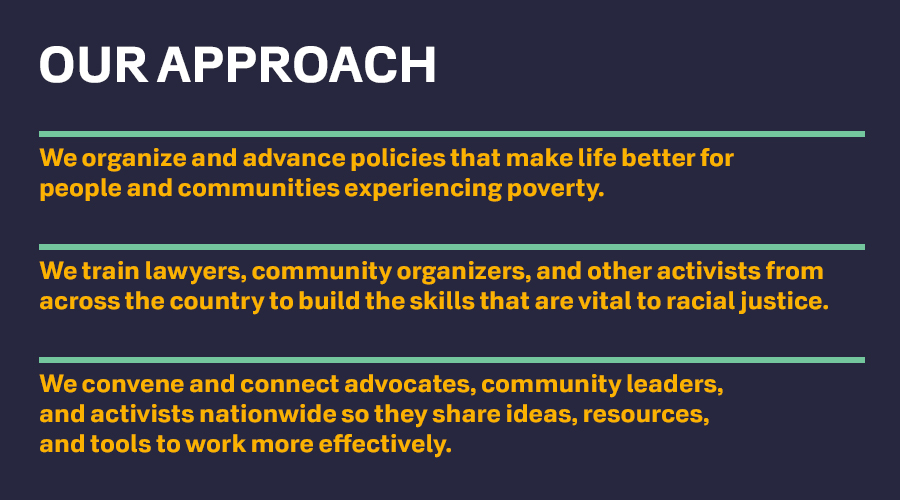
And because these systems were designed with race in mind, we approach solving poverty with a racial justice lens. The solutions require a holistic strategy because people don’t lead single-issue lives. Therefore, we focus on and collaborate across multiple systems and sectors affecting children and families.
Economic justice: We work to ensure children and families receive income supports to meet their needs and that people can get jobs with good wages and benefits.
Health justice: We fight to eliminate barriers to affordable, quality health care for people and families with low income, no matter their race, gender, or where they’re from.
Housing justice: We work to ensure people have access to quality housing, regardless of their source of income, arrest or criminal record, or eviction history.
Family and community justice: We advocate for policies that support parents, keep families together, and help people thrive in their communities.
Our work with our partners in these areas is a blueprint for innovative impact that can be shared with other communities. Litigation is one of our strategies to shape policy that provides justice for all. We also work locally and nationally to effect change by training and convening multi-state networks of public interest attorneys and other advocates.
The Racial Justice Institute, our groundbreaking national leadership program, has trained and supported a network of over 400 advocates in over 100 organizations. We also lead the Legal Impact Network, a dynamic collaborative of 38 state- based advocacy organizations from across the country working to end poverty and achieve racial justice.
Through our unique approach to advocacy, we are changing the rules to change lives.

Black children are disproportionately represented in foster placement in Illinois. They make up 44 percent of over 21,000 children in foster placement in Illinois, despite only accounting for 14 percent of the total child population. Nationally, they represented 22 percent of all children in the foster system in 2021, but only 14 percent of the total child population.
This stark disparity highlights systematic biases and structural inequalities that lead to higher rates of family separation. Racial disproportionality perpetuates cycles of trauma, disrupts family units, and often results in negative long-term outcomes for children and their families, further underscoring an urgent need for reform and equity-driven solutions.
Children placed in the foster system experience higher rates of homelessness and housing instability. Black youth are at greatest risk.
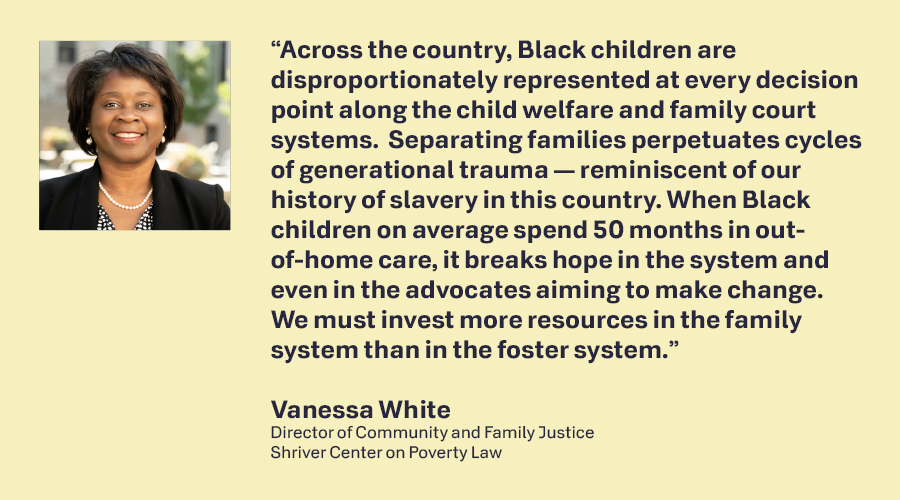
The Solution
Addressing the issue of racial disproportionality in the child welfare system requires a multifaceted approach that combines policy reform, community engagement, and systematic change. To help maintain crucial support networks, policies must prioritize kinship care and family preservation over the removal of children from their homes.
It is time to stop penalizing poverty by shifting resources to families and children who need them the most. One of the most promising initiatives is the joint effort of a dedicated task force initiated in 2021 (HB3821), co-chaired by the Shriver Center on Poverty Law and Lutheran Child and Family Services of Illinois. The Shriver Center helped pass the legislation to establish the task force.
The Impact
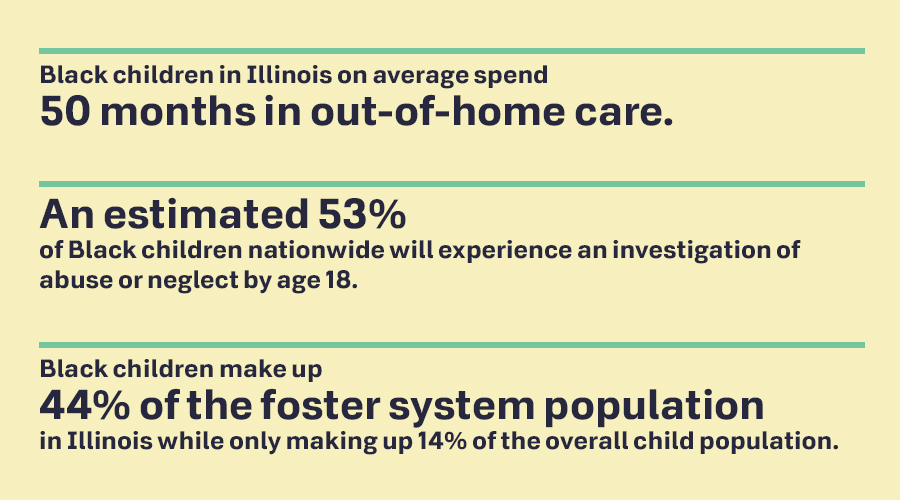
Collaboration is at the heart of the Racial Disproportionality in Child Welfare Task Force. The task force partners with the Illinois Department of Children and Family Services (DCFS) and Lutheran Child and Family Services of Illinois, along with lawyers, advocates, private agencies, public agencies, and legislators, to explore both current and alternative policies and practices, with the goal of improving outcomes for Illinois families.
The task force is a foundational step to identify the tools and resources essential for effective solutions. Currently, the group meets monthly to create informed and efficient recommendations to Gov. J.B. Pritzker that will ultimately keep families together, provide parents with better resources, elevate youth voice, and limit the time children, particularly Black children, spend in the system.
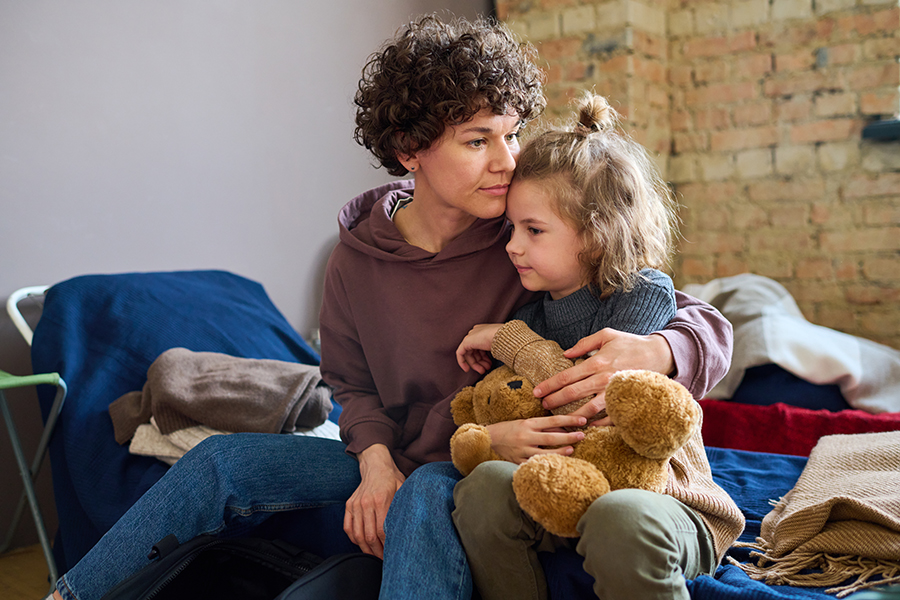
Everyone needs a safe, secure, and affordable place to live. But in recent years, eviction has emerged as a national crisis because of rising housing costs, stagnant wages, and minimal protections for tenants, all made worse by the pandemic.
Landlords deny access to housing based on eviction records generated by tenant screening companies. This discriminatory practice affects Black mothers the most.
An eviction filing can lead to job insecurity, economic instability, and, in the worst cases, homelessness. Even though fewer than 50 percent of filings in Illinois result in an eviction, tenant screening companies include records even if a case was dismissed, the tenant wins the case, or there is no material violation of the lease. And Black mothers are most at risk because of racial bias and inequitable systems.
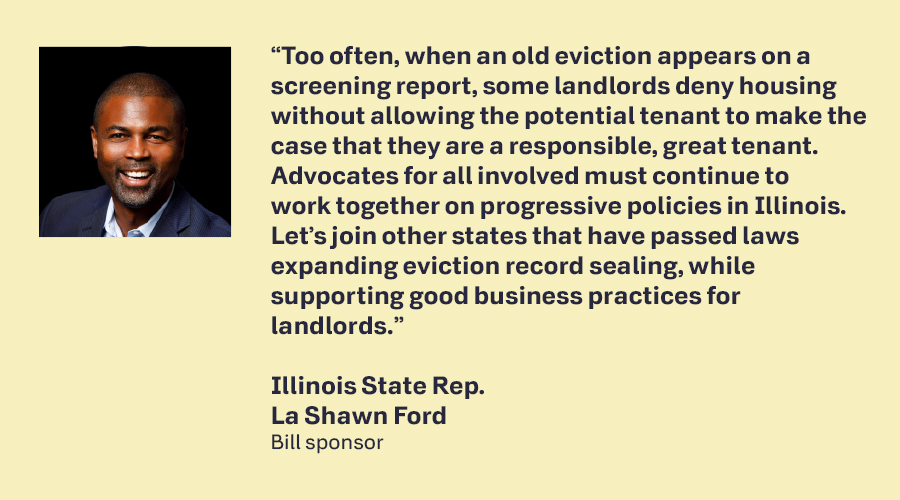
The Solution
The COVID-19 Emergency Housing Act required sealing all eviction records between March 2020 and March 2022. Signed into law by Gov. J.B. Pritzker in the spring of 2021, the act created protections for people in Illinois struggling to pay their rent or mortgage as a result of economic instability during the pandemic.
Working with partners, the Shriver Center on Poverty Law advocated for passage of this legislation. The law put safeguards in place to prohibit tenant screening companies from disseminating sealed court records.
The Impact

An estimated 60,000 Illinois households were vulnerable to eviction in 2021 as a result of the pandemic, according to information from the Illinois Department of Human Services. Since pandemic protections have mostly expired, homelessness has been on the rise, affecting communities of color at disproportionate rates. In Chicago, 73 percent of unhoused individuals and 90 percent of unhoused families are Black. A large percentage of those individuals were in the foster system.
The Shriver Center will continue to work with Illinois State Rep. La Shawn Ford and State Sen. Karina Villa on legislation to seal certain evictions records. Sensible regulation of tenant screening companies gives individuals and families access to stable housing.

Everyone should have the financial resources to support themselves and their family members. Yet nearly 38 million people — 1 in 10 — experienced poverty in 2021.
It’s long past time to unbuckle the “bootstraps” narrative arguing that people experiencing poverty simply need to work harder or make better personal choices. In fact, policies and laws that create and perpetuate poverty and racial inequity are written into the fabric of our nation.
Systemic factors, including the legacy of racism and white supremacy, contribute to America’s high poverty rate. In particular, Black and Latino/a/x families, who face discrimination in employment, housing, and access to government benefits, suffer higher poverty rates, and have been unable to build generational wealth.
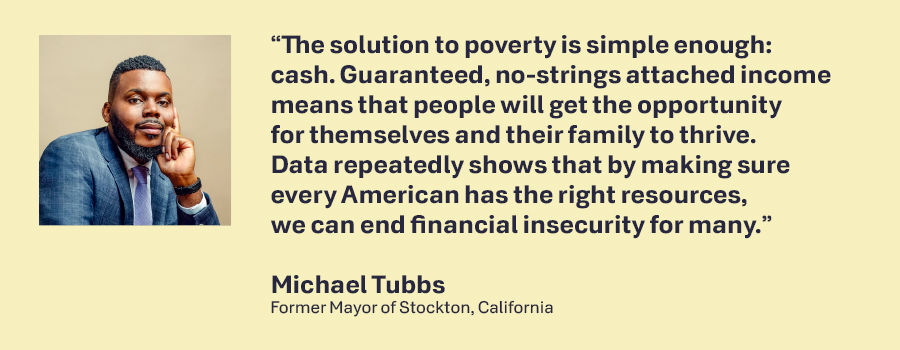
The Solution
It’s time to ensure the financial security of all families by providing a guaranteed income. A guaranteed income program provides recurring cash payments, with no strings attached, to a targeted group of people who truly need them. As a result, guaranteed income programs are more effective at reducing the racial wealth gap and increasing equity.
A guaranteed income also gives families resilience in the face of financially stressful life events, such as unemployment, divorce, disability, or health problems. The COVID-19 pandemic exposed how many Americans are close to the brink and lack sufficient resources to weather emergencies.
The Shriver Center on Poverty Law successfully advocated for guaranteed income pilot programs in Chicago and Cook County, Illinois. The city program gives $500 monthly to 5,000 Chicago residents for a year. The Cook County program gives $500 monthly to 3,250 residents for two years.
The Impact
A guaranteed income can dramatically reduce poverty and improve families’ long-term well-being. Across the country, pilot programs have measurably improved participants’ financial stability.
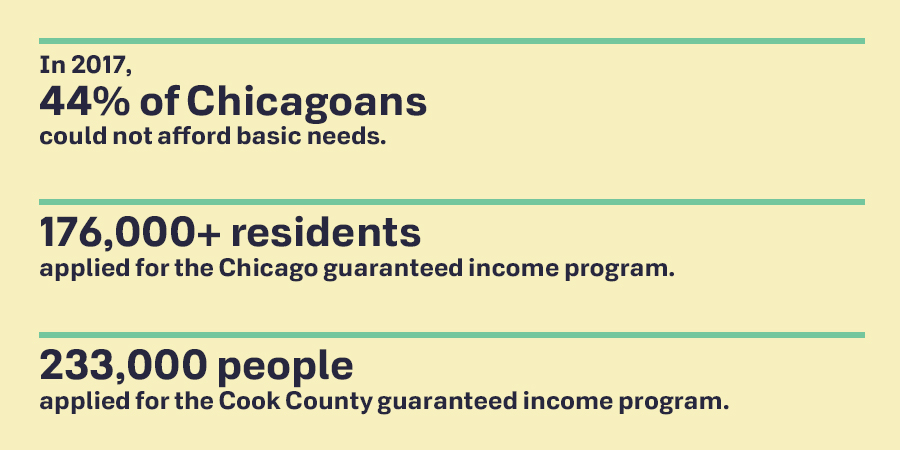
Guaranteed income, along with other safety net benefits, can lift families out of poverty. Income and wealth inequities increase the likelihood that Black and brown children are put into the child welfare system. These disparities are further compounded when the system provides more resources to foster families than it does to parents or kin.
In the last few years, several key federal tax credits were temporarily expanded and made refundable. In 2022, the Shriver Center successfully passed legislation to increase the amount and number of recipients for the Earned Income Tax Credit (tax credit for working individuals). These benefits will begin rolling in the April 2024 tax season.
At the federal level, the Shriver Center is advocating to make temporary tax credits that help low-wage families permanent, a policy position shared by the Biden administration. We help local governments structure their programs, distribute benefits, and determine eligibility. The Shriver Center strongly supports policies and programs that provide a guaranteed income floor for people with the lowest income.
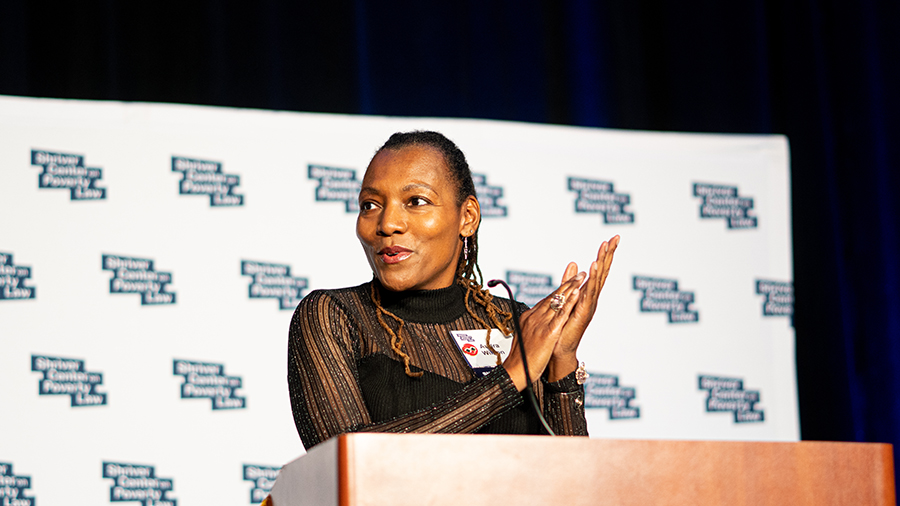
Here are some highlights of your partnership with us:
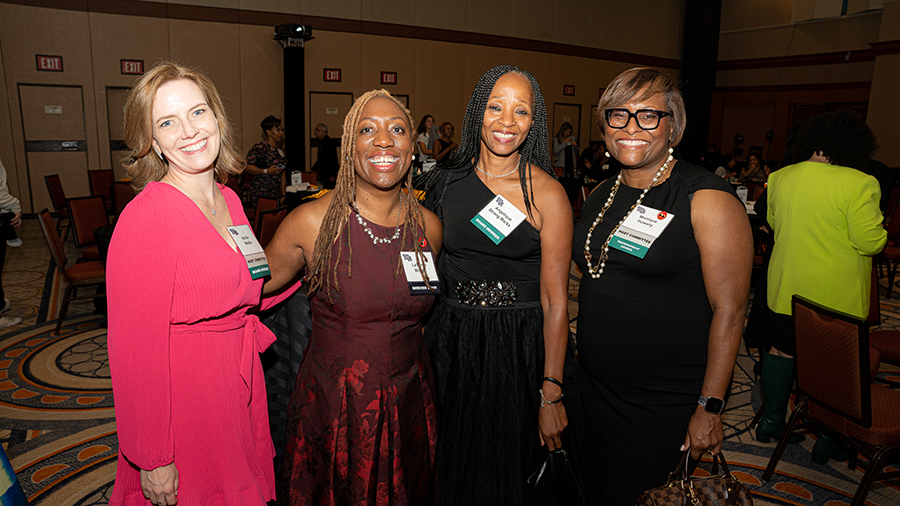
Thank you to our generous donors, funders, and supporters, who make our work for economic and racial justice possible.
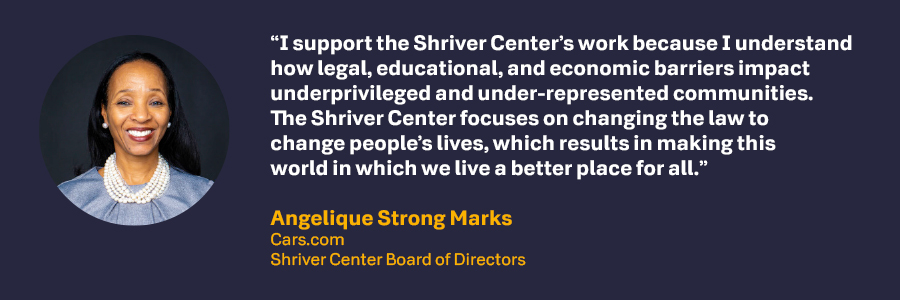
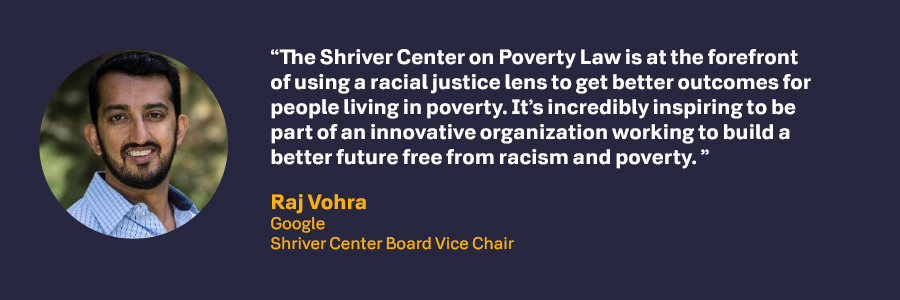
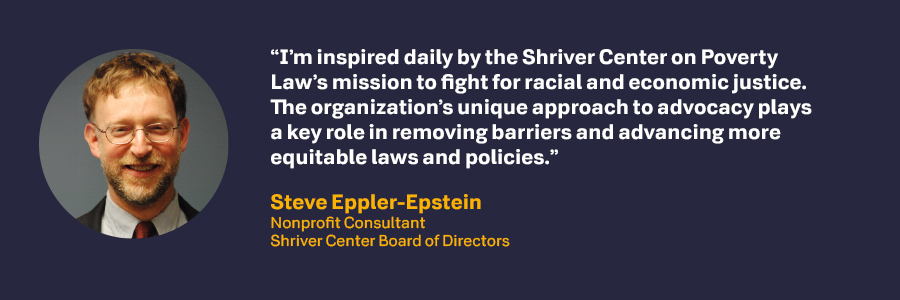
We believe in organizational excellence at all levels, grounded in our core values and measured against progress toward our mission to guide our path to success.
Below is a snapshot of the Shriver Center’s revenue and expenses for FY 2022. Our Audited Financial Statement and tax form 990 for FY 2022 are available for download.
